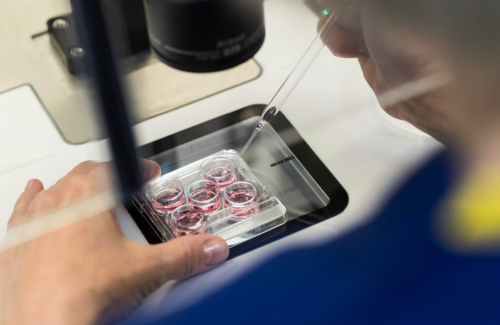Supplements to take to increase fertility
Experiencing infertility and undergoing fertility treatments, can be a difficult journey and sometimes it can feel like we have no control. That’s why it’s important to take back control where we can.
Best fertility supplements to help fertility
There’s a lot of discussion about whether taking fertility supplements and vitamins can help increase fertility. Everyone will react differently; some people swear by them whereas others don’t see them as conclusive results. But either way, this is one way to feel more in control of your fertility.
For more information on how to feel prepared for IVF read our article.
Why do I need to take vitamins or fertility supplements?
What we do know is that vitamins play an essential role in all our bodily functions, including our reproductive system. Vitamins are used in:
• Menstruation and ovulation in women
• Thyroid function
• Energy production
• Immune function
• Egg quality and maturing
If we’re deficient in certain vitamins it can help to take supplements and in some cases can help reduce symptoms of infertility such as polycystic ovarian syndrome (PCOS).
Taking fertility tablets isn’t something only women should consider, certain supplements have been shown to increase sperm quality and motility also.
Please note that we should always aim to get as many vitamins, minerals and nutrients through a healthy diet and taking supplements should never be in place of a balanced diet. Read our advice on the Fertility Diet here.
You might be interested in…
Always consult a doctor
Our reproductive systems are complex and everyone’s body has different needs, that’s why it’s so important to consult a doctor before taking any supplements. Especially because taking the right amount of vitamins/minerals is critical as we need to create the correct environment for a healthy pregnancy.
Some vitamins can have an undesired effect, if too much is taken or they interact with other medications being taken, so it is always important to discuss your personal history with your doctor.
At The Evewell our fertility experts can help you make the right decision. If you are considering taking fertility supplements or need any other fertility advice please get in touch with us by emailing appointments@evewell.com or giving us a call on 020 3974 0950.
What supplements should I take to increase fertility?
We’ve broken down our supplement recommendations by who they are most suitable for. Read on to find out what supplements increase fertility in men and women.
Fertility supplements for both women and men
Acetyl L-carnitine
Acetyl L-carnitine, a form of the amino acid L-carnitine (LC), helps turn fat into energy and occurs in the body naturally. It’s also thought to help slow down the ageing process in the reproductive system.
Acetyl L-carnitine has stronger antioxidant properties, which are particularly helpful for female fertility than LC. However, taking both (ALC) and (LC) together can help with PCOS, endometriosis and the absence of a period (amenorrhea).
Advantages for men: helps sperm motility (the way it moves).
Dose: Ranges between 1-3g per day for both males and females.
B vitamins
Advantages for women: B vitamins can help promote improved egg health and prevent ovulatory infertility.
Advantages for men: they can improve the quality of sperm.
Folic acid is a B vitamin, usually used to help with pregnancy and fertility for women. However, there are other kinds of B vitamins which have many helpful properties as they are important for the formation and functioning of red blood cells.
Vitamins B1, B2, B3, B6 and B12, are all associated with a lower risk of an ovulation disorder, ovulatory infertility. Vitamin B12 in particular has been linked to increasing fertility in women undergoing IVF or other fertility treatments, whereas low levels of B12 have been linked to female infertility.
Dose: A B-complex multivitamin can usually provide a lot of your recommended B vitamins.
Calcium
It is important to ensure we don’t encounter any deficiencies whilst trying to conceive as we want to ensure the body is working at its optimum. Calcium is also important in the development of a baby’s bones, blood vessels and heart. However, more specifically a calcium deficiency in men could cause infertility issues as it helps the production of sperm.
Advantages for both men and women: increasing your calcium intake can prevent a deficiency, and for men specifically, calcium can help create sperm.
Recommended dose: It’s always better to get calcium from a healthy diet such as eating full fat yogurt, cheese and dark leafy greens (e.g. spinach). However, if you are deficient it would be recommended to take 1000mg a per day.
Coenzyme Q10
Advantages for women: coenzyme Q10 can help improve the ovarian response to IVF.
Advantages for men: it can improve sperm motility.
Coenzyme Q10 is an enzyme which is created in the body naturally and helps generate energy in our cells, however unfortunately as we get older its production can decrease. Increasing it again using a supplement may help fertility, especially when going through IVF.
Dose: Dosage varies depending on your specific needs however, anything between 300-1000mg a day for women and 200mg a day for men may be recommended.
Vitamin D
Advantages for women: Vitamin D can help with ovarian stimulation.
Advantages for men: it can help with improving semen quality
We can usually form vitamin D from receiving sun on our skin, however, a lot of us don’t get the amount we need (especially in the UK!) Vitamin D plays a vital role in the reproductive systems of both men and women and low levels can be associated with infertility and PCOS in women.
Dose: 1000 IU or less for women and between 2000-4000 IU for men could be recommended.
Vitamin E
Advantages for women: Vitamin E can generally boost female reproductive health and help with good endometrial development.
Advantages for men: it can improve sperm motility.
Vitamin E is an antioxidant and can increase fertility for both men and women. Low levels of Vitamin E have been linked to infertility in both sexes.
Dose: 15mg per day.
Omega-3’s
Advantages for women: omega-3s can be particularly helpful to women over 35.
Advantages for men: it can improve sperm quality overall.
Omega-3 fatty acids are essential to our body and are linked to improved embryo implantation, decreased premature labour, and improved sperm motility, morphology and quantity.
Dose: It’s better to try and get these from a healthy diet, eating things such as fatty fish and nuts. However, if you do require a supplement, we recommend 500-100mg daily.
Selenium
Advantages for women: Selenium can be linked to a reduced risk of miscarriage.
Advantages for men: it can also improve sperm quality overall.
Selenium is a powerful mineral that plays an essential role in the functioning of the body and is particularly important in the reproductive system. It can also help promote healthy follicles in the ovaries.
Selenium deficiency has been linked to miscarriages and low semen quality and motility.
Dose: 50mcg per day.
Zinc
Advantages for women: Zinc can help with fertilisation and egg development.
Advantages for men: it can help improve sperm quality.
Zinc supports fertility by regulating hormone functions, cell division and ovulation. Despite being essential, our bodies do not store zinc, so it can be required to take zinc supplements. Zinc deficiencies are linked to lower sperm quality and taking more time to conceive.
Dose: 8mg is recommended for women and 11mg for men.
Probiotics
In recent media coverage, there’s been significant attention on the importance of gut health, highlighting its crucial role in maintaining overall well-being, including reproductive health.
Central to this is the role of probiotics in balancing gut bacteria, which in turn affects digestion, immunity, and nutrient absorption. Probiotics work by nurturing beneficial bacteria in the gut, thereby strengthening the body’s natural defences, enhancing digestive health, boosting immunity, and improving nutrient absorption. Importantly, this balance also impacts reproductive health, influencing hormonal balance and functionality.
Multivitamins
Multivitamins are a convenient and effective way to supplement essential vitamins and minerals, potentially enhancing fertility outcomes, offering a comprehensive blend of nutrients in a single dose, addressing potential deficiencies and supporting reproductive health.
For women aiming to optimise fertility, prenatal multivitamins are particularly crucial. These formulations typically include key nutrients such as folate, choline, iodine, iron, and Vitamin D, which are vital for reproductive health.
On the other hand, men looking to enhance fertility should prioritise multivitamins rich in antioxidants and specific vitamins and minerals, such as Vitamin C and E, to help protect sperm from oxidative stress, and zinc to support sperm production and overall reproductive function.
Fertility supplements for women
Folic acid/folate
Advantages: helps pregnancy and the outcome of fertility treatments
Folic acid is a B Vitamin, it is the synthetic version of folate which is naturally formed in the body and it helps pregnancy and the outcome of fertility treatments.
Taking folic acid before you start to conceive, and up to 12 weeks into your pregnancy can help to prevent birth defects such as spina bifida.
Recommended dose: Between 400-800mcg per day should be taken at least a month before trying to conceive.
Iron
Advantages: helps prevent anaemia.
Iron supplements play a crucial role in supporting women’s fertility by addressing the risk of anaemia, which can cause ovulatory deficiency and poor egg health.
Recommended dose: Roughly 27mg of iron per day.
Myoinositol
Myoinositol helps to regulate menstrual cycles, maintaining hormonal balance, and stabilising mood.
Particularly beneficial for women with polycystic ovary syndrome (PCOS), myoinositol addresses insulin resistance and promotes ovulatory function.
Recommended dose: Depending on your specific needs, please consult a doctor if you are considering taking Myoinositol.
L-Arginine
Advantages: can help if your protein intake is low and so may be helpful for vegetarians/vegans.
L-arginine, a naturally occurring amino acid, can help uterine health by enhancing endometrial thickness, making it particularly useful for individuals with low protein intake, such as vegetarians and vegans.
Recommended dose: 1000-2000mg daily.
Male fertility supplements
Vitamin C
Advantages: helps support sperm quantity and mobility.
Vitamin C stands out as a vital supporter of male fertility, enhancing both sperm quantity and mobility.
As a potent antioxidant, it plays a pivotal role by bolstering the number, mobility, and overall quality of sperm, as well as minimising cellular damage and fostering optimal sperm health.
Recommended dose: 90mg.
L-Citrulline
Advantages: improves the quality of semen.
L-Citrulline plays a pivotal role in enhancing semen mobility, motility, and quantity, by facilitating the synthesis of nitric oxide, a key player in sperm function and male reproductive health.
Recommended dose: 2g daily.
All Categories
Find out more
Ready to talk? Our team of experts are only one phone call or email away to offer support and help deciding your next steps. To arrange a 15 minute, no-obligations, call with a member of our Patient Services Team, contact us today.












